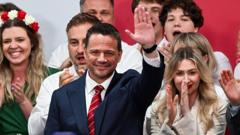Poland is on edge following a tightly contested presidential election pitting liberal candidate Rafal Trzaskowski against conservative contender Karol Nawrocki. Though Trzaskowski declared victory based on preliminary exit polls, the winning margin is teetering on uncertainty, making the race one of the closest in Polish electoral history.
Poland's Presidential Election: A Nail-Biter Comes Down to the Wire

Poland's Presidential Election: A Nail-Biter Comes Down to the Wire
Tensions rise as Rafal Trzaskowski and Karol Nawrocki await official results from a razor-thin Polish presidential election.
In the immediate aftermath of voting, an exit poll suggested that Trzaskowski, the current Mayor of Warsaw, edged out his rival Nawrocki with 50.3% of the votes against Nawrocki's 49.7%. This narrow margin falls within the 3% margin of error, raising concerns about the accuracy of the poll and leaving both candidates in a state of unease as they await the official announcement scheduled for Monday morning.
Joyful supporters surrounded Trzaskowski as he claimed victory, exclaiming, "We won," while acknowledging the slimness of his lead by referring to the phrase "razor's edge." Addressing his supporters, Trzaskowski emphasized his commitment to unify the country, promising to be a president for all citizens, regardless of political affiliations.
Conversely, Nawrocki urged his followers to remain hopeful, stating, "Let's not lose hope for this night," emphasizing that the difference in votes is minimal and expressing confidence that he might awaken to news of his own victory as President.
The role of the Polish president is largely ceremonial, but the winner's power to veto legislation could significantly impact Prime Minister Donald Tusk's pro-European Union government, especially after a period of conflict with the outgoing conservative president, Andrzej Duda. Tusk's administration has struggled under Duda's veto powers, which hindered key reforms on issues such as judicial independence and abortion rights.
Should Trzaskowski's lead hold true, it would pave the way for Tusk to push forward his legislative agenda, shaping Poland's engagement within the larger European community. However, opposition persists even among Tusk’s coalition partners, namely the conservative People's Party, particularly on social issues.
Both candidates pledge continued support for Ukraine amidst the ongoing conflict, yet diverge on their attitudes towards Ukraine's prospects of joining NATO and the European Union, with Trzaskowski favoring integration that strengthens Poland's role in Europe.
Nawrocki, a relatively unknown figure until his nomination by the Law and Justice party, champions a strong, sovereign Poland and staunchly opposes further EU influence over national policies. A former amateur athlete, Nawrocki's image starkly contrasts with that of Trzaskowski, who is viewed as part of the liberal elite out of touch with traditional Polish values.
As election day unfolded, both candidates faced personal controversies that could sway voter perceptions. Trzaskowski's backers highlight his pro-European stance and urban appeal, while Nawrocki’s past as a football hooligan, alongside allegations concerning his character, posed challenges that might have haunted his campaign.
The uncertainty of the election results continues to leave Poland in suspense, as citizens reflect on the implications the next presidency holds for national identity and the country’s trajectory in Europe. The official results will determine not just the winner but the future political landscape in Poland amid a controversial chapter of democratic engagement.
Joyful supporters surrounded Trzaskowski as he claimed victory, exclaiming, "We won," while acknowledging the slimness of his lead by referring to the phrase "razor's edge." Addressing his supporters, Trzaskowski emphasized his commitment to unify the country, promising to be a president for all citizens, regardless of political affiliations.
Conversely, Nawrocki urged his followers to remain hopeful, stating, "Let's not lose hope for this night," emphasizing that the difference in votes is minimal and expressing confidence that he might awaken to news of his own victory as President.
The role of the Polish president is largely ceremonial, but the winner's power to veto legislation could significantly impact Prime Minister Donald Tusk's pro-European Union government, especially after a period of conflict with the outgoing conservative president, Andrzej Duda. Tusk's administration has struggled under Duda's veto powers, which hindered key reforms on issues such as judicial independence and abortion rights.
Should Trzaskowski's lead hold true, it would pave the way for Tusk to push forward his legislative agenda, shaping Poland's engagement within the larger European community. However, opposition persists even among Tusk’s coalition partners, namely the conservative People's Party, particularly on social issues.
Both candidates pledge continued support for Ukraine amidst the ongoing conflict, yet diverge on their attitudes towards Ukraine's prospects of joining NATO and the European Union, with Trzaskowski favoring integration that strengthens Poland's role in Europe.
Nawrocki, a relatively unknown figure until his nomination by the Law and Justice party, champions a strong, sovereign Poland and staunchly opposes further EU influence over national policies. A former amateur athlete, Nawrocki's image starkly contrasts with that of Trzaskowski, who is viewed as part of the liberal elite out of touch with traditional Polish values.
As election day unfolded, both candidates faced personal controversies that could sway voter perceptions. Trzaskowski's backers highlight his pro-European stance and urban appeal, while Nawrocki’s past as a football hooligan, alongside allegations concerning his character, posed challenges that might have haunted his campaign.
The uncertainty of the election results continues to leave Poland in suspense, as citizens reflect on the implications the next presidency holds for national identity and the country’s trajectory in Europe. The official results will determine not just the winner but the future political landscape in Poland amid a controversial chapter of democratic engagement.





















